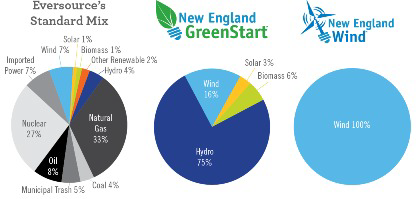Renewable Electricity with Wind
As 2016 becomes a year marked by record-breaking temperatures, droughts, floods, and wildfires, you may be wondering what you can do to personally combat climate change. Many people in Sharon have contributed to the expansion of solar energy in Massachusetts with home energy audits, roof solar panels, or signing up for participation in a solar farm. An additional option is wind. Choose local renewable energy for your electricity with the Boston-based nonprofit, Mass Energy Consumers Alliance (Mass Energy).
Choosing Renewables
You can choose where your electricity comes from. Mass Energy is driven by its mission to make energy more affordable and environmentally sustainable. It offers a green power program to Eversource and National Grid electric customers. Members of Mass Energy pay a couple extra cents per kilowatt-hour in order to match their electricity use with local renewable energy. In other words, for each kilowatt-hour you pull off the electric grid, Mass Energy makes sure one kilowatt-hour comes onto the electric grid from a local, community-based renewable energy source. Because of the buying power of its members, Mass Energy is able to sign long-term power purchase contracts for wind turbines and other types of renewable energy projects during the development phase. All the green power sources are located in New England, and because Mass Energy is a nonprofit, the additional cost you pay for green power is federally tax-deductible.
We cannot reduce our emissions enough to avert the worst effects of climate change without onshore wind, which is why Mass Energy focuses on supporting small wind turbines. You may have heard that wind turbines cause bird fatalities or otherwise harm wildlife. This is mostly a myth. Wind technology has advanced to the point where properly sited modern wind turbines cause minimal wildlife fatalities—certainly fewer than drilling for oil, hydraulic fracturing, coal mining, the combustion of fossil fuels, or the loss of habitat, floods, droughts, and fires from climate change. Many major conservation organizations support wind development. In Massachusetts, the Audubon Society (which began as a society for the protection of birds) supports properly sited wind turbines (massaudubon.org/wind). In fact, Mass Audubon matches its own electricity use at its sanctuaries through Mass Energy’s program.
Electricity Choices
There are two renewable energy options to choose from—New England GreenStart and New England Wind—which differ in cost and content. For information, massenergy.org/green or 617-524-3950, ext. 5. If you aren’t an Eversource or National Grid customer, visit massenergy.org /newf to learn how you can make a one-time contribution to support local wind power. Mass Energy also runs a Discount Heating Oil Service, where members save between 15 to 30 cents/gallon compared to the state average for full-service dealers. If you heat your home with oil, consider signing up for our program and choosing biodiesel, which will reduce your emissions and help your furnace run cleaner. (massenergy.org/heating-oil).
[Article adapted from Mass Energy]

